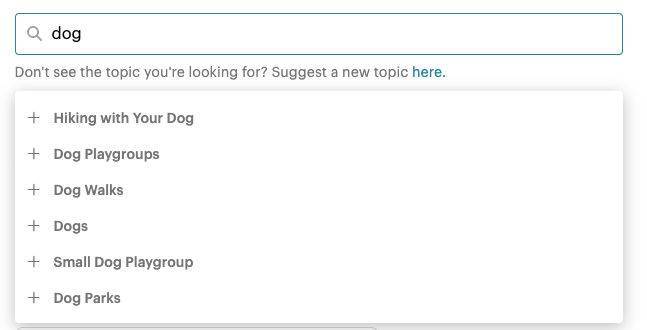The key to growing a successful Meetup group is to let the people who share an interest in your community know about your events. One common strategy for expanding your group’s membership is to get your group’s events in front of as many people as possible. This is where group and event topics become important—they are how the Meetup platform understands what a group is about and who might be interested in it. Read on to learn more about maximizing your experience using categories on Meetup.
For a larger audience, select a wide range of relevant topics
Topics are a group of descriptors that help Meetup’s platform determine what your group is about, and who should be notified about your group. For example, if you host a group for basketball, relevant topics would clearly be “sports,” “basketball,” “exercise,” and “fitness”. Depending on the categories and topics that Meetup members have selected, your group will be matched with people who share similar interests.
To get your group in front of more people, choose more relevant topics—relevant being the important word here. Choosing more topics that don’t apply to your group might get more eyes on your group page, but they are less likely to turn into a new membership or an event RSVP.
To reach a larger, less targeted audience, select a wide range of topics that represent your group at a glance. For example, imagine that you organize a social chess club for people in their 30s-40s who like to meet outdoors. Some obvious topics you could choose would be “chess,” “chess enthusiasts,” or even “speed chess.” But you don’t need to limit your group to the immediate topics at hand. You would reach a wider audience when you select: “chess,” “social,” “30s-40s,” or “outdoors,” instead of only choosing chess-related topics. Another way to take advantage of topics is to use them to describe the attributes of your group. In the chess example, relevant topics could be “beginner” or “advanced,” depending on the skill level of the games you’d like to host.
By broadening your topics, your group will be recommended to members who are interested in any of the distinct categories, even if they may not have selected “chess” as an interest. This is advantageous if your goal is to grow your group and include people who may like to play chess casually.
For a more targeted audience, select specific topics
Sometimes it’s more important to have a dedicated audience than a big one. By having a small group of highly interested members, it’s more likely that RSVPs will turn into attendees. To optimize your group, select fewer topics that are more pertinent to your group.
Say you want to meet other owners of golden retrievers. In that case, you should choose “golden retriever” among group topics. But if you’re open to meeting any dog owners of any breed, choose “dogs.”
Remember, the more specific you get, the fewer people will share the categories you select as an interest. Our recommendation is to keep your topics more general and diverse in order to reach a bigger community, with a combination of different attributes to describe your group at a quick glance.

Don’t see your preferred topic? Try synonyms.
If you don’t immediately see the topic you had in mind, get creative by trying a similar alternative. For example, if you wanted to add “clay” as your topic, try searching for other similar topics like “ceramics” or “pottery.” Right now, the latter two will show up while the first will not.
The Meetup team is always working to improve our algorithms and recommendation models. We’re improving our back-end systems to understand the relationships and suggest related topics, so you may see a different result when you come back a month later. As we continue to review and categorize more topics, new ones show up when you search for them.

If you can’t find the topic, you are welcome to suggest a new topic. Meetup employees manually review the topics you suggest to categorize them and add them to our database. You can refer to Meetup’s product release notes for a list of newly added topics or reach out to Meetup’s Community Support team for topic-related inquiries.
For more tips, tricks, and community-building ideas, head to the Organizer Guide on Meetup’s Community Matters Blog. Stay updated on the latest news by following Meetup on Twitter, Instagram, Facebook, and LinkedIn.
Last modified on November 6, 2023










